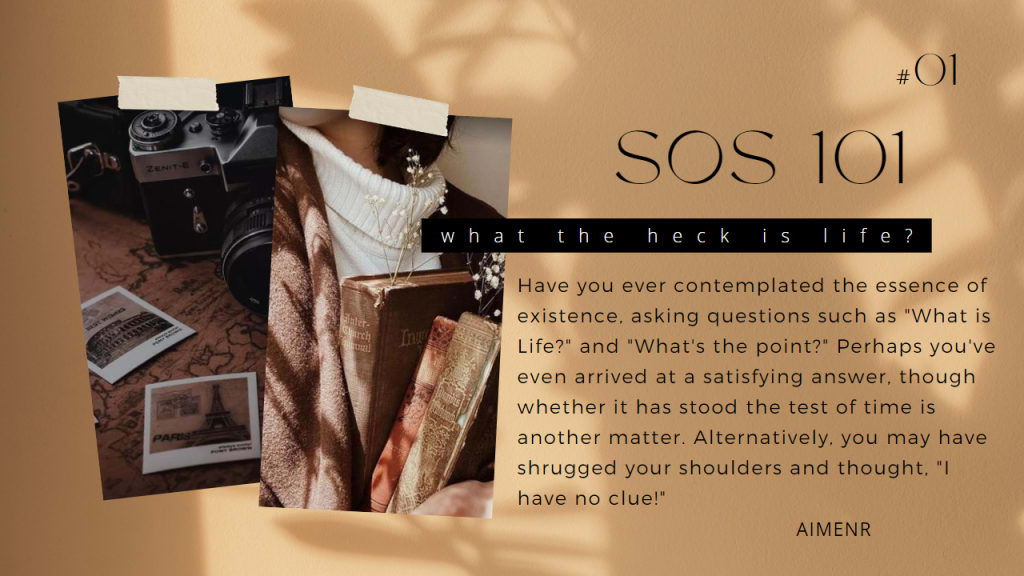
Have you ever contemplated the essence of existence, asking questions such as "What is Life?" and "What's the point?" Perhaps you've even arrived at a satisfying answer, though whether it has stood the test of time is another matter. Alternatively, you may have shrugged your shoulders and thought, "I have no clue." The inquiry that precedes "What's the meaning of life?" is, naturally, "Does life have a meaning?" Alas, the answer to that is unclear. For the purpose of this exploration, let's assume that life does have meaning and focus on the first question.
Life is an intricate and enigmatic notion that has captivated the curiosity of philosophers, scientists, and theologians for centuries. The query of why we are here and what our objective is can be an arduous one to address. There are those who contend that life lacks any inherent meaning, and that we must create our own purpose, while others believe that there is a higher objective or meaning that we must endeavor to comprehend. Regardless of whether or not there is an ultimate meaning to life, it is unmistakable that our existence is brimming with opportunities for personal development, education, and forging bonds with others. Ultimately, the inquiry of the meaning of life is a personal one, and the resolution will likely differ from individual to individual.
The matter of the purpose and meaning of life is multifaceted and intricate, with diverse individuals and cultures presenting a variety of solutions. For some, the purpose of life may revolve around the pursuit of happiness and contentment, while for others, the ultimate objective may be to attain spiritual enlightenment or to serve a higher power.
It is crucial to acknowledge that there is no conclusive response to this query, and that every person may possess their own individualized outlook on the meaning of life. Moreover, one's comprehension and viewpoint of the purpose of life may transform over time, as their beliefs, experiences, and awareness of the surrounding world develop and mature.
Hence, it is pertinent to contemplate the subject of the meaning of life as a malleable and constantly evolving notion. While arriving at a conclusive response may be challenging, the process of pondering and investigating this question can offer valuable insights into an individual's principles, convictions, and perception of the world.
In the event that life lacks any meaning or objective, then any contemplation about the significance of existence becomes irrelevant. However, for the purposes of a game titled "Life Matters," we will proceed with the assumption that there is indeed a purpose to life. The first query of this game would be, "What is the purpose of life?" This inquiry has been extensively examined by scholars, spiritual leaders, and individuals throughout history, and the answer may be subjective, varying depending on an individual's values, beliefs, and life experiences.
Here's my answer:
Life is for doing, learning, and enjoying.
Humans are inherently creatures of action and productivity. When not engaged in a specific task, we tend to spend our time contemplating and planning our next course of action. Even during sleep, we continue to move and dream. Regular exercise is important to maintain our physical ability to continue doing things.
Our physical design is uniquely suited to enable us to engage in a range of activities. Unlike trees that are stationary, humans can travel and explore diverse locations. Our emotional state is equally flexible and dynamic, ranging from joy to sorrow in mere moments. Our cognitive abilities allow us to navigate complex mental landscapes and journey to far-off destinations through memory, intelligence, and imagination.
Regarding the natural world, humans have left a significant mark by changing, processing, painting, preserving, moving, or altering virtually every aspect of it. This predisposition towards altering our environment is a clear reflection of our innate drive to continually reshape and improve the world around us.
From a distance, human activity can resemble the frenzied movement of ants. This prompts us to ask: "What is the purpose of all this doing?" Unlike inanimate objects such as rocks, which are passive and unchanging, humans possess the ability to act and create. We must meet our basic needs through our actions, but even after these are satisfied, we continue to engage in purposeful activity. The question remains: why do we do it?
My suggestion:
Our doing allows for more learning.
Is life all about learning? Well, it depends on what one wants to learn. There is a vast array of knowledge to acquire. In the first five years of our lives, we acquired essential skills like walking, talking, eating, socializing, and a plethora of facts about our surroundings, which distinguishes us from newborns. During the ages of five to ten, we acquired more knowledge like reading, writing, mathematics, geography, history, science, music, and sports. In addition to formal education, we continued to learn about people, including friends, family members, foes, supporters, detractors, and rivals. However, some of the information we learned early on turned out to be accurate, while some of it was not.
There are certain things that we need to re-learn or un-learn as we grow, and in the process, we may also learn how to deal with disappointment, although this is not always the case.
If we observe the trajectory of most people's lives, we tend to see significant growth until the age of fifteen or twenty. After this point, growth may either slow down, come to a complete stop, or, in some instances, reverse.
When people finish their formal education, they often consider themselves finished with learning. However, what is it about the act of renting a cap and gown and receiving a diploma that makes us feel like our learning journey is complete? Even though there is still much to learn, and "commencement" - which means a new beginning - doesn't just refer to graduation.
As we engage in more learning, our capacity for action also increases. Similarly, as we engage in more action, we gain further knowledge. However, it's crucial to remember that among all these activities, one essential lesson is the enjoyment we derive from them.
The term "joy" is a unique word in that it does not have an obvious opposite formed by adding the prefixes "un," "dis," or "in" to it. While terms like pleasure and displeasure, happiness and unhappiness, and gratitude and ingratitude have clear opposing pairs, "joy" does not have a direct opposite.
In the midst of life's most unpleasant experiences, we have a choice: we can complain or try to find a lesson in it. Perhaps the key is to find pleasure in the act of learning, as Confucius suggested long ago when he said he could still find joy in simple things. Wordsworth also wrote about the profound insights that can come from finding harmony and joy within ourselves.
In conclusion, life is an incredible journey of doing, learning, and enjoying. Every day, we have the opportunity to grow, expand our horizons, and experience the world around us. By embracing the process of learning, we can find joy even in the midst of difficulty and disappointment. The purpose of all this doing and learning may not always be clear, but by approaching life with a curious and open mindset, we can uncover valuable lessons and experiences that enrich our lives. So, let us embrace the journey of life, with all its ups and downs, and find joy in the process of learning and growing.
About the Creator
Author AimenR
Even the dead tell stories...
Instagram: https://www.instagram.com/_authoraimenr/
Facebook: https://www.facebook.com/authoraimenr/
Medium: https://authoraimenr.medium.com/
Enjoyed the story? Support the Creator.
Subscribe for free to receive all their stories in your feed. You could also pledge your support or give them a one-off tip, letting them know you appreciate their work.






Comments
There are no comments for this story
Be the first to respond and start the conversation.